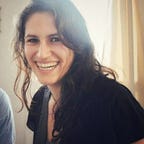What I Learned about Community on a Cold Night in a Castle
The afternoon had been pleasantly sunny. I’d packed my jacket away in my suitcase on the train ride from Paris. Now I was trying to dig it out, in an empty tent, outside a castle, and the light was fading. Jet-lagged and exhausted, I didn’t know who to talk to about getting bedding and a lantern. The temperature was rapidly dropping.
POC21 was a crazy, utopian, unreal-sounding vision: over 100 eco-hackers taking over a disused French château as an alt-event to the COP21 climate talks in Paris, saying, ‘Enough talk; let’s build some real solutions’.
Teams building 12 carbon-reducing open-source hardware projects joined a range of international mentors and supporters, like me, to live together on the castle grounds for 6 weeks, “prototyping a fossil free, zero waste society.”
Even now, I think it’s amazing that POC21 really happened. The organisers secured major funding from sponsors (it turns out that while some corporations are in climate denial, re-insurers, who insure the insurance companies, absolutely know what’s coming), and brought together 100 impressive participants. There was a fab lab in the old horse stables, compost toilets on the front lawn, and a giant sign at the grand entrance, proclaiming “There are no passengers on Spaceship Earth. We are all crew”.
But none of us were really prepared for setting up a mini-society in a place lacking basics like working electricity, internet, and heat. The castle had dozens of rooms, but not enough for everyone to sleep inside. Throw on top of that cultural differences, language barriers, interpersonal conflict — and an unusually severe summer cold snap.
As soon as I arrived, it was clear the organizers were overwhelmed. I watched the eyes of a harried young woman with a clipboard widen at the gathering crowd.
“Where do I get blankets?”
“There’s no mattress in my room.”
“I didn’t think it would be this cold.”
Communities are built on a social contract, the foundation of which is meeting basic human needs like food, bathrooms, and shelter. Communities ask their members to set aside their individual needs in favor of a collective system, to spread out risk, achieve economies of scale, and share resources. It’s a leap of trust.
But if people are insecure about basic needs, the contract starts to break down. In my privileged first-world life, I don’t get much chance to witness this happening, especially not in a nascent community newly forming.
I observed some fascinating human behavior on this, my first night at POC21. If there is no clear community solution to a critical need, people will begin solving it in different ways.
Centralised bureaucracy:
“Put your name down on this list if you need bedding. We’ll organise a big order of sleeping bags from a local supplier. They’re closed now for the weekend, and then we’ll have to wait half a week for delivery….”
Individualism:
“I’m just going to go online and buy myself a sleeping bag off Amazon. What’s the delivery address of this castle? Wait, is there even WiFi?”
Personal appeal:
“I can’t handle cold. Come on, I know you know where some sleeping bags are. Just give me one. I won’t tell anyone.”
Misguided savior:
“I’m heading to town to buy blankets for everyone. I’ll just spend my own money, I don’t care. No, I don’t know how many we need, or where the store is, or if it’s open... or how to speak French.”
Vigilante:
“I just saw two people empty a storage closet of blankets and run off into the gardens.”
On the brink of chaos, we were pulled back from the edge. The crucial move in this moment was to serve dinner. Luckily it was ready at just that moment. Collaboration cannot function if people are too tired or hungry.
After eating warm food, things were feeling a bit calmer and an effective distributed protocol was possible. We started telling everyone arriving locally by car to put any spare blankets and sleeping bags in a specific place, and directed those who came by plane without enough to grab what they needed.
It turns out that, collectively, we had enough for everyone.
